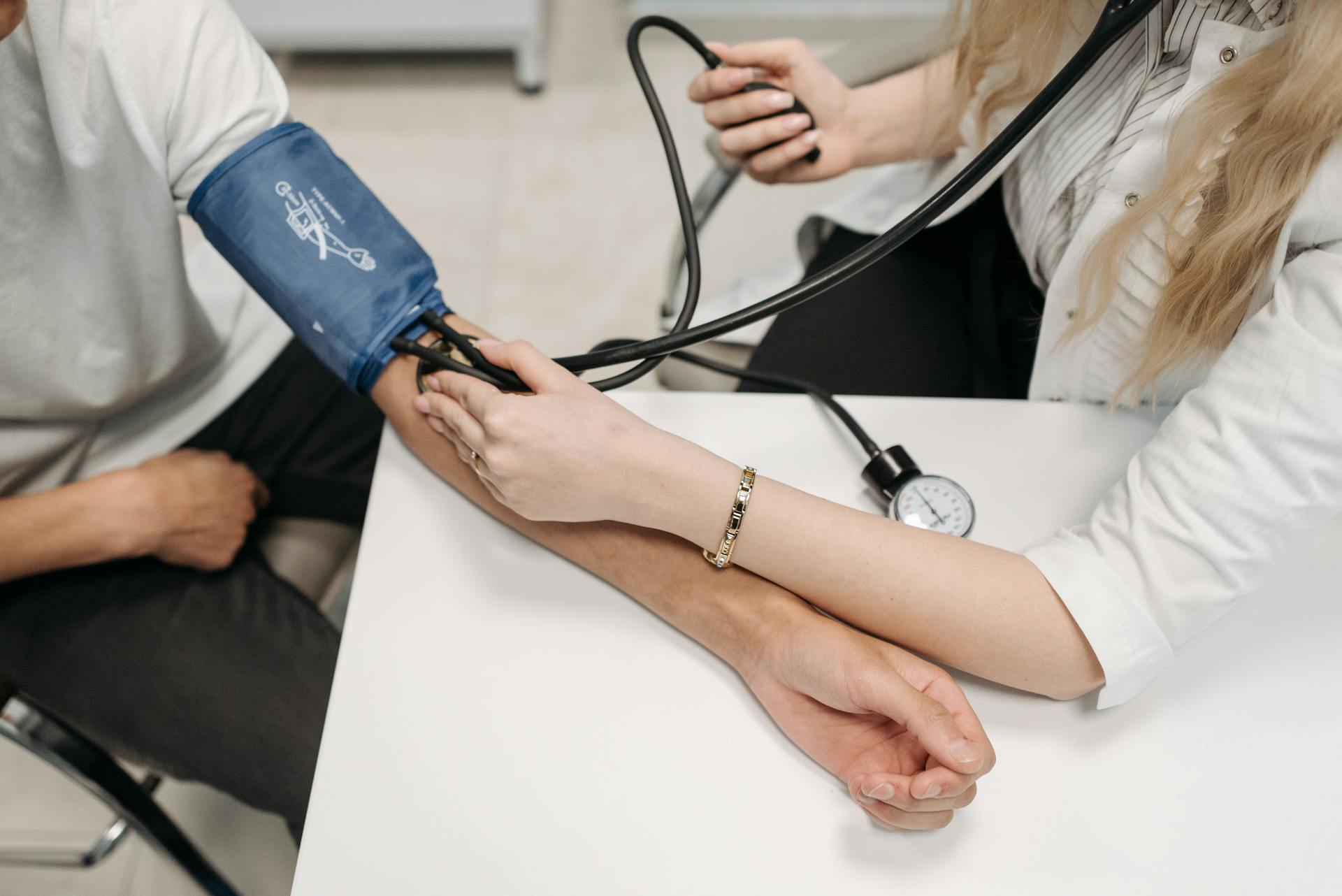
To be eligible for MassHealth, you must be a resident of Massachusetts, a U.S. citizen, national, or qualified non-citizen, and have a certain level of income.
MassHealth has different programs with varying income limits, so it's essential to check which one you qualify for. The most common programs are MassHealth Standard, MassHealth CommonHealth, and MassHealth Limited.
To enroll in MassHealth, you can apply online, by phone, or in person. You'll need to provide documentation, such as proof of income, identity, and residency.
The application process usually takes a few weeks, but you can start receiving coverage sooner if you're eligible for emergency coverage.
On a similar theme: Masshealth Dental Coverage
Eligibility Basics
MassHealth has strict eligibility criteria, including income and asset limits. Careful planning is essential to meet these requirements and preserve assets for yourself and your family.
MassHealth eligibility rules are more generous than many other Medicaid programs. This means that individuals with lower incomes are more likely to qualify.
To qualify for MassHealth, individuals must have household incomes up to certain levels, which vary depending on their age and family status. For example, children up to age 1 can qualify with household incomes up to 205% of the federal poverty level (FPL).
Here are the MassHealth eligibility income levels for different groups:
Who Is Eligible?
Eligibility for Medicaid in Massachusetts is a bit more generous than in other states. The program is called MassHealth.
Children under the age of 1 can qualify with household incomes up to 205% of the federal poverty level (FPL).
For kids between the ages of 1 and 18, the income limit is 155% of FPL.
Pregnant women can also qualify with incomes up to 205% of FPL, and their coverage continues for 12 months after the baby is born.
If you're a parent or other adult, you're eligible for MassHealth with incomes up to 138% of FPL.
Here's a breakdown of the income limits for different groups:
Apply
To apply for Medicaid in Massachusetts, you have several options. You can apply online or by phone, and there are also in-person options available.
You can apply online by visiting MAhealthconnector.org. This is a convenient option, but be aware that you'll need to fill out the application and submit it electronically.
To apply by phone, you can call 1-800-841-2900 or use the TTY line at 1-800-497-4648 if you're deaf or hard of hearing. This option is great for those who prefer to speak with a representative or need assistance with the application.
You can also apply in person at a MassHealth Enrollment Center. To find a center near you, check the left side of this webpage or call 1-888-665-9993 (TTY: 1-888-665-9997 for those who are deaf or hard of hearing).
Here are the different eligibility categories and their corresponding income limits:
- Children up to 1 year: household income up to 200% of FPL
- Children ages 1-18: household income up to 150% of FPL
- Pregnant women: household income up to 200% of FPL
- Adults: household income up to 138% of FPL
2014 Temporary Enrollment
In 2014, the Massachusetts Health Connector faced significant technological challenges, which led to a temporary enrollment process in MassHealth.
About 325,000 applicants were temporarily enrolled in MassHealth due to the exchange glitches.
This temporary enrollment allowed residents to have health insurance despite the exchange issues, but it also cost the state around $140 million in 2014.
By the end of January 2015, about 130,000 people who had been temporarily placed on MassHealth in 2014 had been able to verify their eligibility for coverage through Massachusetts Health Connector.
Roughly half of them were eligible for MassHealth and remained covered under the program, while the rest were able to transition to private plans with subsidies if eligible based on household income.
Additional reading: Able Account Eligibility
Verifications in 2015
In 2015, the government started verifying income through the IRS Data Retrieval Tool for the FAFSA.
This tool allowed the IRS to share tax return information with the FAFSA application, making it easier for students to get their financial aid applications done.
The IRS Data Retrieval Tool was available for students and parents who had already filed their taxes for the previous year.
By using this tool, students and parents could transfer their tax information directly into the FAFSA application.
This streamlined process helped reduce errors and made the application process faster and more efficient.
Check this out: Masshealth Application Form Online
Several Different Plans
MassHealth offers several different plans for seniors in Massachusetts, each with its own unique features and benefits.
The Standard plan is one of the options available.
For disabled individuals, CommonHealth is a plan that provides coverage.
CarePlus is designed for individuals eligible for both MassHealth and Medicare.
Limited is a plan that offers restricted coverage.
Buy-In allows individuals eligible for Medicare to enroll in MassHealth, which helps cover Medicare premiums and cost-sharing.
Senior Buy-In (SBI) is a plan for individuals over 65 who are eligible for Medicare, helping to pay for Medicare Part A and Part B premiums.
Here's an interesting read: Mutual Omaha Medicare Supplement Eligibility
Gifting
Gifting can be a strategic way to reduce countable assets and mitigate the impact of the lookback period.
To use gifting effectively, gifts must be made outside the lookback period, which is a crucial detail to keep in mind.
MassHealth regulations require that gifts be made at least 60 months before applying for MassHealth benefits, so it's essential to plan ahead.
Gifting can be used to reduce countable assets, but it's not a magic solution – it's just one tool in the toolbox to help you achieve MassHealth eligibility.
For example, if you gift assets within the lookback period, it could actually disqualify you from receiving MassHealth benefits, so be sure to follow the rules carefully.
If done correctly, gifting can be a powerful way to protect your assets and ensure a smoother transition to MassHealth eligibility.
Medicare and Healthcare
To be eligible for MassHealth, applicants must live in Massachusetts and meet both clinical and financial requirements. Financial eligibility is determined by factors like income, assets, family size, and living situation.
Applicants must also fall into an eligible category, which can be based on age, family situation, work history, immigration status, or healthcare needs. This means that individuals with certain characteristics, such as being 65 or older, may be eligible for MassHealth.
Readers also liked: Masshealth Financial Assistance
Turning 65: Key Changes
As you approach your 65th birthday, you'll need to consider your healthcare options carefully. Medicare is a program open to seniors age 65 and older to assist with health care costs.
Medicaid, also known as MassHealth, has different eligibility requirements than Medicare. There are two major changes in MassHealth eligibility as you reach your 65th birthday.
One of these changes is that your eligibility for MassHealth is no longer based on income and assets. Instead, you'll need to consider other factors to determine your eligibility.
Readers also liked: Aetna Medicare Supplement Eligibility
Healthcare
To be eligible for Medicaid / MassHealth, you must live in Massachusetts and meet both clinical and financial requirements. You're considered financially eligible if you have a low to medium income and assets, taking into account family size, living situation, and the type of coverage you're applying for.
MassHealth financial eligibility also considers your immigration status, work history, and healthcare needs. This means that your eligibility is determined by a combination of factors, not just one.
In general, those in a household with low to medium income and assets are financially eligible for MassHealth. This can include individuals with disabilities, families with children, and low-income adults.
Daily Living Services are also a part of MassHealth, providing support for daily activities such as bathing, dressing, and eating.
Financial
To be eligible for MassHealth, your income plays a big role.
A single individual can't have countable assets worth more than $2,000.
Your home's equity also matters - it can't be worth more than $1,033,000 in 2023.
If you're married and only one spouse is applying for Medicaid, the individual applying can't have assets worth more than $2,000.
The other spouse can have a home and assets worth up to $148,620 in 2023.
With some planning, you can protect some of your assets to make yourself eligible.
Frequently Asked Questions
What is an acceptable proof of income for MassHealth?
Acceptable proof of income for MassHealth includes your most recent federal income tax return (1040, 1040A, or 1040EZ) and your Social Security benefit award letter or annual benefit statement (SSA-1099)
Who is covered by MassHealth?
MassHealth covers qualifying children, families, seniors, and people with disabilities living in Massachusetts. It provides health benefits and financial assistance for health insurance premiums to these eligible groups.
Sources
- https://myfamilyestateplanning.com/2024/07/05/understanding-masshealth-eligibility-income-and-asset-limits/
- https://mbakerlaw.com/masshealth-medicaid-eligibility/
- https://myfamilyestateplanning.com/2024/09/23/can-turning-65-impact-masshealth-eligibility/
- https://www.healthinsurance.org/medicaid/massachusetts/
- https://sociuslawfirm.com/practice-area/masshealth-eligibility/
Featured Images: pexels.com


